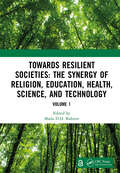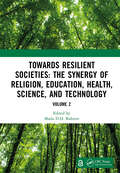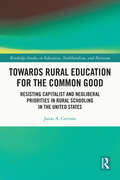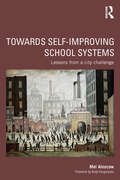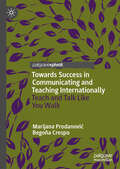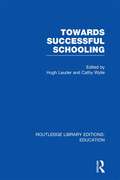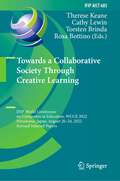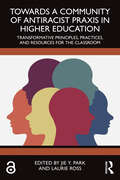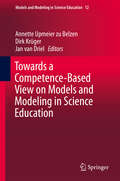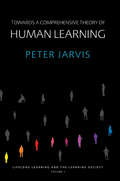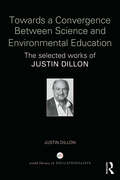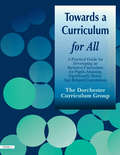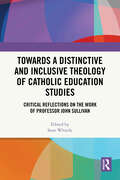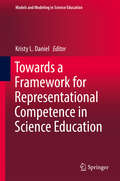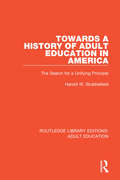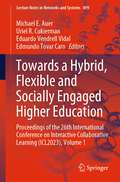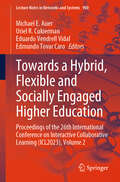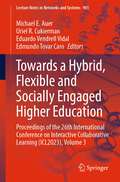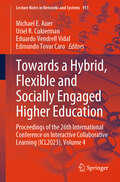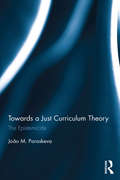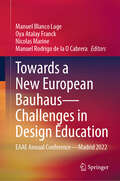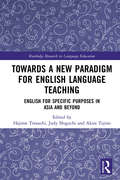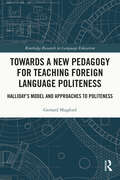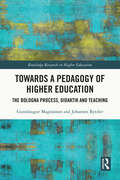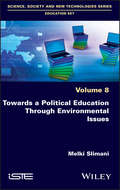- Table View
- List View
Towards Resilient Societies: Proceedings of the International Conference on Innovative Interdisciplinary Science for Inclusive and Sustainable Future (GreenThink 2024), Jakarta, Indonesia, September 12th—13th, 2024 (Volume 1)
by Rahiem, Maila D.H.Resilience and sustainability are essential in navigating today’s global challenges. Towards Resilient Societies: The Synergy of Religion, Education, Health, Science, and Technology presents innovative interdisciplinary research that explores how diverse fields contribute to building adaptive and inclusive communities. This book highlights the intersections of governance, education, health, science, technology, social transformation, and ethical perspectives in achieving sustainable development.This proceedings publication features 164 peer-reviewed papers by scholars all over the world, and delves into seven key themes: education and psychology in resilience-building; governance and political transformation; economic and legal frameworks for sustainability; scientific and technological advancements for societal resilience; religion, ethics, and sustainability; language, communication, and humanities in cultural and social sustainability; and gender equity and inclusive development. By integrating these themes, the book aligns with the United Nations Sustainable Development Goals (SDGs) and provides theoretical and practical insights for shaping a sustainable future.This is an essential resource for academics, researchers, policymakers, and professionals in sustainability, governance and development studies, science and technology, education and health, and social sciences. It offers evidence-based insights and strategic recommendations for fostering more resilient and equitable societies.
Towards Resilient Societies: Proceedings of the International Conference on Innovative Interdisciplinary Science for Inclusive and Sustainable Future (GreenThink 2024), Jakarta, Indonesia, September 12th—13th, 2024 (Volume 2)
by Rahiem, Maila D.H.Resilience and sustainability are essential in navigating today’s global challenges. Towards Resilient Societies: The Synergy of Religion, Education, Health, Science, and Technology presents innovative interdisciplinary research that explores how diverse fields contribute to building adaptive and inclusive communities. This book highlights the intersections of governance, education, health, science, technology, social transformation, and ethical perspectives in achieving sustainable development.This proceedings publication features 164 peer-reviewed papers by scholars all over the world, and delves into seven key themes: education and psychology in resilience-building; governance and political transformation; economic and legal frameworks for sustainability; scientific and technological advancements for societal resilience; religion, ethics, and sustainability; language, communication, and humanities in cultural and social sustainability; and gender equity and inclusive development. By integrating these themes, the book aligns with the United Nations Sustainable Development Goals (SDGs) and provides theoretical and practical insights for shaping a sustainable future.This is an essential resource for academics, researchers, policymakers, and professionals in sustainability, governance and development studies; science and technology; education and health; and social sciences. It offers evidence-based insights and strategic recommendations for fostering more resilient and equitable societies.
Towards Rural Education for the Common Good: Resisting Capitalist and Neoliberal Priorities in Rural Schooling in the United States (Routledge Studies in Education, Neoliberalism, and Marxism)
by Jason A. CervoneThis book examines the current and future state of rural education in North America through the lens of Franco Berardi’s Futurability. Through critical examination of examples and current trends toward corporatization and privatization of rural education, the volume highlights how future possibilities and social imagination in rural spaces have been limited by neoliberal forces, capitalist interests, and workforce education. Cervone demonstrates how Berardi’s concept of creating future can be embraced to foster critical thought, challenge injustices, and open opportunity. With this line of analysis, the book ultimately supports an ethos of a return to education for the common good. Bringing an important perspective to the field of rural education scholarship, this work will be of interest to scholars and researchers in sociology of education and education policy.
Towards Self-improving School Systems: Lessons from a city challenge
by Mel AinscowThis important new book draws lessons from a large-scale initiative to bring about the improvement of an urban education system. Written from an insider perspective by an internationally recognized researcher, it presents a new way of thinking about system change. This builds on the idea that there are untapped resources within schools and the communities they serve that can be mobilized in order to transform schools from places that do well for some children so that they can do well for many more. Towards Self-improving School Systems presents a strategic framework that can help to foster new, more fruitful working relationships: between national and local government; within and between schools; and between schools and their local communities. What is distinctive in the approach is that this is mainly led from within schools, with senior staff having a central role as system leaders. The book will be relevant to a wide range of readers throughout the world who are concerned with the strengthening of their national educational systems, including teachers, school leaders, policy makers and researchers. The argument it presents is particularly important for the growing number of countries where increased emphasis on school autonomy, competition and choice is leading to fragmentation within education provision. Foreword by Andy Hargreaves, Thomas More Brennan Chair in Education, Boston College, USA
Towards Success in Communicating and Teaching Internationally: Teach and Talk Like You Walk
by Marijana Prodanović Begoña CrespoThis book is an accessibly-written guide to international communicating and teaching practices. Intended for teachers and practitioners, it is written in a reader-friendly way in order to answer some common questions, and overcome obstacles that arise when interacting internationally. Cross-cultural encounters are often burdened with stereotypes, prejudices and misconceptions, which can lead to unwanted outcomes, miscommunication, and even result in total pragmatic failure. The situation becomes even more delicate when the paths of intercultural communication and teaching-learning processes cross. Its style, form and content make this book a vital resource for students, scholars, teachers, and practitioners working in fields such as applied linguistics, cross-cultural pragmatics, education and teaching, cultural studies, as well as international management.
Towards Successful Schooling (Routledge Library Editions: Education)
by Cathy Wylie Hugh LauderThe editors have compiled this critical and comparative study of changes which took place in the New Zealand education system in the second half of the twentieth century. For other Western societies who have felt the impact of New Right policies the New Zealand case is interesting because it provides some indication of how policies of decentralization in education might be used to develop egalitarian and democratic educational policies. In recent years there have been major changes to educational systems in the Western world. Often these changes have been justified by reference to successful educational practices in other countries. However, it is not always possible simply to abstract educational practices from one context and apply them in another successfully. Moreover claims that policies in one country are more successful than those in another have to be treated cautiously: there are always problems in making valid comparisons between the educational performances of different countries. It is important, therefore, that critical and comparative studies are made of educational systems which take full account of the contexts in which they are embedded.
Towards a Collaborative Society Through Creative Learning: IFIP World Conference on Computers in Education, WCCE 2022, Hiroshima, Japan, August 20–24, 2022, Revised Selected Papers (IFIP Advances in Information and Communication Technology #685)
by Cathy Lewin Rosa Bottino Torsten Brinda Therese KeaneThis book contains the revised selected, refereed papers from the IFIP World Conference on Computers in Education on Towards a Collaborative Society through Creative Learning, WCCE 2022, Hiroshima, Japan, August 20-24, 2022. A total of 61 papers (54 full papers and 7 short papers) were carefully reviewed and selected from 131 submissions. They were organized in topical sections as follows: Digital Education and Computing in Schools, Digital Education and Computing in Higher Education, National Policies and Plans for Digital Competence.
Towards a Community of Antiracist Praxis in Higher Education: Transformative Principles, Practices, and Resources for the Classroom
by Edited by Jie Y. Park and Laurie RossWeaving together theory, research, and practice, this edited volume provides rich accounts of teaching from faculty at a predominantly white institution who participated in a community of antiracist praxis – a cycle of action and reflection on pedagogy.The chapters highlight the ways in which faculty can transform classrooms and colorblind discourses in higher education. They center the voices of faculty who are “on the ground” and grappling with their own positionality and academic training to present an antiracist pedagogy that emphasizes student agency and authority, exposes whiteness in course content and inquiry processes, and introduces students to new ways of knowing that are racially just. Each contributing author offers principles, teaching activities, and resources that readers can apply in their own disciplinary or interdisciplinary contexts.Written for faculty, graduate students, administrators, and pedagogy specialists in higher education, this book urges readers who work in higher education to action, and paves a path forward through the creation of communities of antiracist praxis.
Towards a Competence-Based View on Models and Modeling in Science Education (Models and Modeling in Science Education #12)
by Dirk Krüger Annette Upmeier zu Belzen Jan Van DrielThe book takes a closer look at the theoretical and empirical basis for a competence-based view of models and modeling in science learning and science education research. Current thinking about models and modeling is reflected. The focus lies on the development of modeling competence in science education, and on philosophical aspects, including perspectives on nature of science. The book explores, interprets, and discusses models and modeling from the perspective of different theoretical frameworks and empirical results. The extent to which these frameworks can be integrated into a competence-based approach for science education is discussed. In addition, the book provides practical guidance by outlining evidence-based approaches to diagnosing and promoting modeling competence. The aim is to convey a strong understanding of models and modeling for professions such as teacher educators, science education researchers, teachers, and scientists. Different methods for the diagnosis and assessment of modeling competence are presented and discussed with regard to their potential and limitations. The book provides evidence-based ideas about how teachers can be supported in teaching with models and modeling implementing a competence-based approach and, thus, how students can develop their modeling competence. Based on the findings, research challenges for the future are identified.
Towards a Comprehensive Theory of Human Learning (Lifelong Learning and the Learning Society)
by Peter JarvisAs interest grows in theories of lifelong learning not only across society but also as an area of serious academic study, the need has arisen for a thorough and critical study of the phenomenon. This distillation of the work of renowned writer Peter Jarvis addresses this need, looking at the processes involved in human learning from birth to old age and moving the field on from previous unsystematic and mainly psychological studies. Instead, Jarvis argues that learning is existential, and so its study must be complex and interdisciplinary. The result is a giant step towards building a complete and integrated theory of how humans learn, taking account of existing theories to see if they can be reconciled with a more complex model. Applying his expert analytical approach to this wide-ranging topic, Jarvis looks in detail at: learning in the social context the transformation of experience the outcomes of learning learning and action cognitive theories emotions and learning experiential learning.
Towards a Convergence Between Science and Environmental Education: The selected works of Justin Dillon
by Justin DillonIn the World Library of Educationalists, international scholars themselves compile career-long collections of what they judge to be their finest pieces—extracts from books, key articles, salient research findings, major theoretical and/practical contributions—so the world can read them in a single manageable volume. Readers thus are able to follow the themes and strands of their work and see their contribution to the development of a field, as well as the development of the field itself. Internationally recognized for his research on environmental education, science engagement, learning outside the classroom, and teacher identity and development, in this volume Justin Dillon brings together a thoughtfully crafted selection of his writing representing key aspects of his life and work leading to his current thinking on the need for a convergence of science and environmental education. The chapters are organized around 7 themes: On Habitus; On methodological issues; Developing theories of learning, identity and culture; Challenges and opportunities—science, the environment and the outdoors; Classroom issues—the emergence of Science|Environment|Health; Science engagement and communication; Science, environment and sustainability.
Towards a Curriculum for All: A Practical Guide for Developing an Inclusive Curriculum for Pupils Attaining Significantly Below Age-Related Expectations
by Dorchester Curriculum GroupDesigning an inclusive curriculum for all pupils is not easy. The practicing teachers who have written this book offer clearly laid out ideas and objectives for learning that goes beyond the National Curriculum. It incorporates a holistic approach to the development of a relevant curriculum for pupils and students who experience profound and multiple learning difficulties (PMLD).
Towards a Distinctive and Inclusive Theology of Catholic Education Studies: Critical Reflections on the work of Professor John Sullivan
by Sean WhittleCasting a light on one of the leading British scholars working in the field of Catholic Education Studies, this edited volume scrutinises contemporary issues surrounding the scholarship of John Sullivan over the past three decades, demonstrating the field’s development under his scholarly influence.Giving voice to many internationally established and leading Catholic education scholars, chapters review and critically appraise the contribution of Sullivan’s work in key areas such as his call for a coherent philosophy of Catholic education; a broader, more inclusive Catholic culture; robust teacher formation; and a coherent understanding of Catholic higher education. The book also discusses the interplay between the pastoral and the prophetic – two complementary aspects that underpin much of Sullivan’s work.Ultimately posing questions for how Catholic educators can and should build on Sullivan’s foundational legacy, this book will appeal to scholars, researchers and postgraduate students in the fields of religious education, history of education and Catholic educational studies more broadly.
Towards a Framework for Representational Competence in Science Education (Models and Modeling in Science Education #11)
by Kristy L. DanielThis book covers the current state of thinking and what it means to have a framework of representational competence and how such theory can be used to shape our understanding of the use of representations in science education, assessment, and instruction. Currently, there is not a consensus in science education regarding representational competence as a unified theoretical framework. There are multiple theories of representational competence in the literature that use differing perspectives on what competence means and entails. Furthermore, dependent largely on the discipline, language discrepancies cause a potential barrier for merging ideas and pushing forward in this area. While a single unified theory may not be a realistic goal, there needs to be strides taken toward working as a unified research community to better investigate and interpret representational competence. An objective of this book is to initiate thinking about a representational competence theoretical framework across science educators, learning scientists, practitioners and scientists. As such, we have divided the chapters into three major themes to help push our thinking forward: presenting current thinking about representational competence in science education, assessing representational competence within learners, and using our understandings to structure instruction.
Towards a History of Adult Education in America: The Search for a Unifying Principle (Routledge Library Editions: Adult Education)
by Harold W. StubblefieldOriginally published in 1988 this book examines the work of the first generation adult education theorists and the traditions that their work helped establish. They debated the issues, aims and content of adult education programmes and began to explore the often difficult relationship between social expectations and the potential of education. As well as providing an authoritative history during a period of rapid social change in America, the book confirms that many of the preoccupations of the early thinkers have continued relevance today.
Towards a Hybrid, Flexible and Socially Engaged Higher Education: Proceedings of the 26th International Conference on Interactive Collaborative Learning (ICL2023), Volume 1 (Lecture Notes in Networks and Systems #899)
by Michael E. Auer Uriel R. Cukierman Eduardo Vendrell Vidal Edmundo Tovar CaroThis book contains papers in the fields of collaborative learning, digital transition in education, and AI and learning analytics in engineering education. The authors are currently witnessing a significant transformation in the development of education on all levels and especially in post-secondary education. To face these challenges, higher education must find innovative and effective ways to respond in a proper way. The pandemic period left us with profound changes in the way we teach and learn, including the massive use of new means of communication, such as videoconferencing and other technological tools. Moreover, the current explosion of artificial intelligence tools, mainly used by students, is challenging teaching practices maintained for centuries. Scientifically based statements as well as excellent best practice examples are absolutely necessary. The 26th International Conference on Interactive Collaborative Learning (ICL2023), which took place in Madrid, Spain, between September 26 and 30, 2023, was the perfect place where current trends in higher education were presented and discussed. Since its beginning in 1998, this conference has been devoted to new approaches in learning with a focus on collaborative learning in higher education. Nowadays, the ICL conferences are a forum of the exchange of relevant trends and research results as well as the presentation of practical experiences in learning and engineering pedagogy. In this way, the authors try to bridge the gap between ‘pure’ scientific research and the everyday work of educators. Interested readership includes policy makers, academics, educators, researchers in pedagogy and learning theory, schoolteachers, learning industry, further and continuing education lecturers, etc.
Towards a Hybrid, Flexible and Socially Engaged Higher Education: Proceedings of the 26th International Conference on Interactive Collaborative Learning (ICL2023), Volume 2 (Lecture Notes in Networks and Systems #900)
by Michael E. Auer Uriel R. Cukierman Eduardo Vendrell Vidal Edmundo Tovar CaroThis book contains papers in the fields of educational virtual environments, future of education, project-based learning (PBL), and digital education strategy and engineering pedagogy. The authors currently witnessing a significant transformation in the development of education on all levels and especially in post-secondary education. To face these challenges, higher education must find innovative and effective ways to respond in a proper way. The pandemic period left us with profound changes in the way we teach and learn, including the massive use of new means of communication, such as videoconferencing and other technological tools. Moreover, the current explosion of artificial intelligence tools, mainly used by students, is challenging teaching practices maintained for centuries. Scientifically based statements as well as excellent best practice examples are absolutely necessary. The 26th International Conference on Interactive Collaborative Learning (ICL2023), which took place in Madrid, Spain, between September 26 and 30, 2023, was the perfect place where current trends in higher education were presented and discussed. Since its beginning in 1998, this conference has been devoted to new approaches in learning with a focus on collaborative learning in higher education. Nowadays, the ICL conferences are a forum of the exchange of relevant trends and research results as well as the presentation of practical experiences in learning and engineering pedagogy. In this way, the authors try to bridge the gap between ‘pure’ scientific research and the everyday work of educators. Interested readership includes policy makers, academics, educators, researchers in pedagogy and learning theory, schoolteachers, learning industry, further and continuing education lecturers, etc.
Towards a Hybrid, Flexible and Socially Engaged Higher Education: Proceedings of the 26th International Conference on Interactive Collaborative Learning (ICL2023), Volume 3 (Lecture Notes in Networks and Systems #901)
by Michael E. Auer Uriel R. Cukierman Eduardo Vendrell Vidal Edmundo Tovar CaroThis book contains papers in the fields of engineering pedagogy education, research in engineering pedagogy, and games in engineering education. The authors are currently witnessing a significant transformation in the development of education on all levels and especially in post-secondary education. To face these challenges, higher education must find innovative and effective ways to respond in a proper way. The pandemic period left us with profound changes in the way we teach and learn, including the massive use of new means of communication, such as videoconferencing and other technological tools. Moreover, the current explosion of artificial intelligence tools, mainly used by students, is challenging teaching practices maintained for centuries. Scientifically based statements as well as excellent best practice examples are absolutely necessary. The 26th International Conference on Interactive Collaborative Learning (ICL2023), which took place in Madrid, Spain, between September 26 and 30, 2023, was the perfect place where current trends in higher education were presented and discussed. Since its beginning in 1998, this conference has been devoted to new approaches in learning with a focus on collaborative learning in higher education. Nowadays, the ICL conferences are a forum of the exchange of relevant trends and research results as well as the presentation of practical experiences in learning and engineering pedagogy. In this way, the authors try to bridge the gap between ‘pure’ scientific research and the everyday work of educators. Interested readership includes policy makers, academics, educators, researchers in pedagogy and learning theory, schoolteachers, learning industry, further and continuing education lecturers, etc.
Towards a Hybrid, Flexible and Socially Engaged Higher Education: Proceedings of the 26th International Conference on Interactive Collaborative Learning (ICL2023), Volume 4 (Lecture Notes in Networks and Systems #911)
by Michael E. Auer Uriel R. Cukierman Eduardo Vendrell Vidal Edmundo Tovar CaroWe are currently witnessing a significant transformation in the development of education on all levels and especially in post-secondary education. To face these challenges, higher education must find innovative and effective ways to respond in a proper way. The pandemic period left us with profound changes in the way we teach and learn, including the massive use of new means of communication, such as videoconferencing and other technological tools. Moreover, the current explosion of artificial intelligence tools, mainly used by students, is challenging teaching practices maintained for centuries. Scientifically based statements as well as excellent best practice examples are absolutely necessary.The 26th International Conference on Interactive Collaborative Learning (ICL2023), which will take place in Madrid, Spain, between 26th and 30th September 2023, will be the perfect place where to present and discuss current trends in Higher Education.Since its beginning in 1998 this conference is devoted to new approaches in learning with a focus on collaborative learning in Higher Education. Nowadays the ICL conferences are a forum of the exchange of relevant trends and research results as well as the presentation of practical experiences in Learning and Engineering Pedagogy. In this way we try to bridge the gap between ‘pure’ scientific research and the everyday work of educators.
Towards a Just Curriculum Theory: The Epistemicide
by João M. ParaskevaTowards a Just Curriculum Theory: The Epistemicide responds to a need for ‘alternative ways of thinking about alternatively’ about education and curriculum. It challenges the functionalism of both dominant and specific counter-dominant education and curriculum perspectives and in so doing suggests an Itinerant Curriculum Theory (ICT) as a new path for the field. The volume brings challenges critical educators to decolonize and to deterritorialize, providing scholars and educators a more nuanced analysis. By offering strategies to achieve a just curriculum theory, and by positioning curriculum theory to establish social and cognitive justice, this book aims to educate a more just and democratic society. With contributions from leading scholars across the field education, this volume argues that to deny the existence of any epistemological form beyond the Western mode can be a form of social fascism, which leads to an uncritical reading of history. Together, the essays offer and encourage a more deliberative, democratic engagement that seeks to contextualize and bring to life diverse epistemologies, value-sets, disciplines, theories, concepts, and experiences in education and beyond.
Towards a New European Bauhaus—Challenges in Design Education: EAAE Annual Conference—Madrid 2022
by Manuel Blanco Lage Oya Atalay Franck Nicolas Marine Manuel Rodrigo de la O CabreraThis book gathers the latest advances and innovations in the field of architectural and design education, as presented at the 2022 annual conference of the European Association for Architectural Education (EAAE AC), “Towards a New European Bauhaus - Challenges in Design Education”, hosted by ETSAM Madrid School of Architecture of the Universidad Politécnica de Madrid, in Madrid, Spain, on August 31–September 2, 2022.
Towards a New Paradigm for English Language Teaching: English for Specific Purposes in Asia and Beyond (Routledge Research in Language Education)
by Akira Tajino Hajime Terauchi Judy NoguchiThis book proposes a new paradigm for English language teaching based on concepts from English for Specific Purposes (ESP) research and applications as well as from growing evidence relating pattern recognition to language learning ability. The contributors to the volume argue that learners should not try to become proficient all-around users of ‘idealistic native-like’ English, but instead should be realistic about what they need to acquire and how to go about achieving their specific goals. The book discusses the present situation by describing the status quo of English language education in Japan, taking into consideration recent trends of CLIL (content and language integrated learning), EMI (English medium instruction), and TBLT (task-based language teaching) as well as the work done on the Common European Framework of Reference for Languages (CEFR). It introduces new movements in ESP in Japan and in other Asian regions, covering topics ranging from genre analysis to corpus linguistics, and presents application examples of ESP practice in a range of educational situations in Japan from the graduate school level to elementary and middle school contexts. It also offers readers application examples of ESP practice in a range of business settings and expands the discussion to the global sphere where EAP and ESP are gaining importance as the number of ELF (English as a Lingua Franca) speakers continue to increase. The book will be of great interest to academics, researchers, and post-graduate students working in the fields of EFL and ESL.
Towards a New Pedagogy for Teaching Foreign Language Politeness: Halliday’s Model and Approaches to Politeness (Routledge Research in Language Education)
by Gerrard MugfordThis book examines how foreign language speakers establish and maintain social and transactional relationships in their target language, and how pedagogic intervention can help learners implement practices that will allow them to participate and react in both socially acceptable and individualistically empowering ways. Arguing that ‘doing’ foreign-language politeness and culture does not simply involve the indiscriminate and uncritical adoption and implementation of target-language patterns and practices, the author advocates instead for active, judicious and even critical social action. As such, the book presents a dynamic and vibrant dimension to target language politeness and cultural practices, demonstrating that raising learners’ critical language awareness in identifying productive communicative resources and assets can lead to successful interpersonal and transactional communication. Building on this notion of a ‘positive’ pedagogy, Halliday’s model of ideational, interpersonal and textual is utilised as a framework for exploring how foreign language users can approach target language politeness in terms of prosocial, interpersonal and contested politeness, with reference to a study of Mexican speakers of English as a foreign language. Heightening awareness of foreign language politeness patterns and practices, as well as presenting knowledge and resources for overcoming challenges and accentuating benefits of a nuanced learning scheme for politeness in foreign language, this book will appeal to language educators, researchers and bilingual speakers. It will also benefit those working across pragmatics, sociolinguistics, TESOL, cultural studies.
Towards a Pedagogy of Higher Education: The Bologna Process, Didaktik and Teaching (Routledge Research in Higher Education)
by Gunnlaugur Magnússon Johannes RytzlerTowards a Pedagogy of Higher Education illustrates how international policy shifts, primarily the Bologna-process, have affected debates around both the purpose and organization of higher education at different levels. This book formulates a theory of teaching in higher education that is grounded in educational theory, contributing to a critical perspective on current ideal forms of higher education and a deeper understanding of the pedagogical role of the university. It illustrates how international policies affect conceptualizations of the purpose of higher education and critically examines the pedagogy of higher education in order to develop a comprehensive educational theory for teaching in higher education. The book illustrates the consequences of discursive ideals of education on teaching practices and provides a theoretical framework for new thinking on higher education. Offering a unique contribution that combines policy analyses, curriculum theory, and educational theory, this book will appeal to academics, scholars and postgraduate students in the field of higher education research and teaching, educational theory, and educational policy.
Towards a Political Education Through Environmental Issues
by Melki SlimaniThe growing field of political education through environmental issues is organized around processes, which reach beyond the formal ones found in academic disciplines and national curricula into informal processes (such as social mobilization) and nonformal processes (such as those found in various international educational recommendations). Using theoretical approaches from the fields of political philosophy and the social sciences, this book develops a simultaneously conceptual and analytical framework for the political in educational content involving environmental issues. This framework is then used to empirically analyze educational content on sustainable development formulated by UNESCO, as well as the Tunisian curriculum. The theoretical and empirical studies carried out in this book lead to proposed curriculum tags for political education through environmental issues, with the intent of opening this field to inclusion in the didactics of curriculum research.
